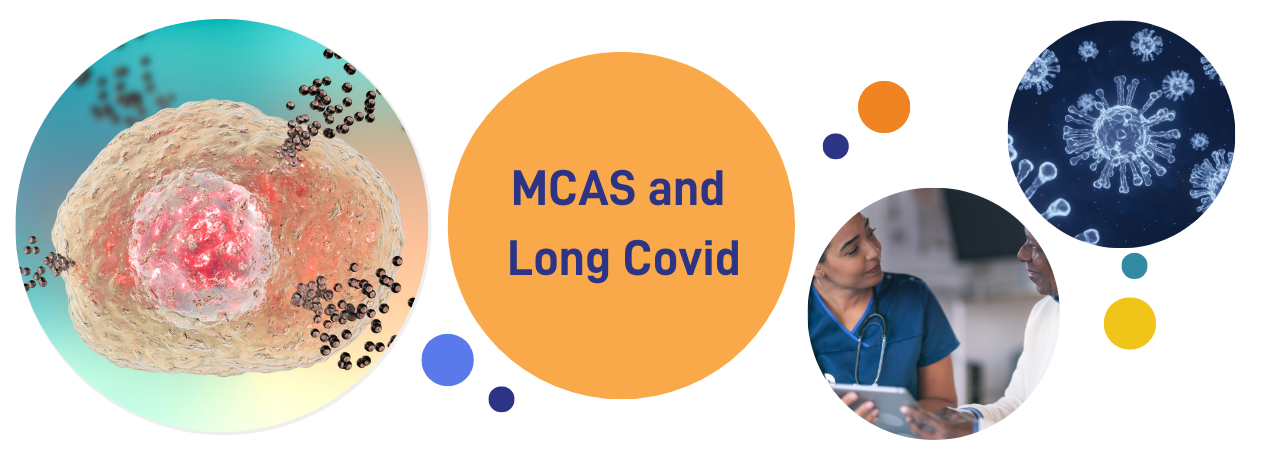
MCAS and Long COVID: Is there a link?
Mast cells are intrinsic immune cells present in connective tissues throughout the body, especially at tissue-environment interfaces. They possess numerous cell-surface receptors which react to various stimuli and, upon activation, release many mediators including heparin, histamine, cytokines, prostaglandins, leukotrienes and proteases (1). Mast Cell Activation Syndrome (MCAS) is an immune mediated disease wherein the release of mast cell chemical mediators lead to heterogenous multisystemic inflammatory and allergic presentations. Diagnosis is unfortunately difficult as diagnostic markers such as urinary N-methyl histamine, urinary prostaglandins D2, DM and F2ª, as well as serum tryptase (which is relatively stable) undergo rapid degradation. (1)
Long Covid is a debilitating illness thought to occur in at least one tenth of cases of SARS-CoV-2 infections (2). Some other researchers have shown that between one month and a year of having COVID-19, 20% of people aged 18 to 64 years have at least one medical condition that may be attributable to COVID-19. Same applies to 1 in 4 patients 65 years or older (3).
It has been proposed that COVID-19 infection could lead to exaggeration of pre-existing undiagnosed MCAS or could activate normal mast cells owing to the persistence of viral particles. Other similarities include the relapse-remission cycle and improvements with similar treatments.(1)
In one study, adults in long covid Facebook support groups were recruited for online assessments of symptoms before and after COVID-19. The questions they had to answer included presence and severity of known MCAS and long COVID (LC) symptoms as well as validated assessments of fatigue and quality of life. Controls included members of the general population as well as MCAS patients who had never experienced COVID-19 symptoms. They found out that mast cell activation symptoms were increased in long COVID and mimicked the symptoms and severity of patients who have Mast Cell Activation Syndrome. They opined that increased activation of aberrant mast cells induced by COVID infection via various mechanisms may explain some of the pathophysiology of long COVID. (4)
Another group of researchers have identified evidence of mast cell activation in sera and lung tissue of patients with acute COVID-19 infection.(5) It is however currently unclear if the activation is persistent and how much it contributes to the morbidity associated with LC. The common symptoms patients with Long COVID reported include fatigue, body aches, loss of taste/smell, anxiety, shortness of breath, brain fog and headaches.
The mainstay of management of Long COVID is symptomatic control, appropriate intervention for remediable complications and recognition of any new medical diagnosis (6). For example, many strategies for treating Myalgic encephalomyelitis/Chronic fatigue syndrome (ME/CFS) are effective for individuals with long COVID which is unsurprising considering their similarities in symptomatology. Occasionally, symptom specific pharmacological options such as B-blockers for POTS, low dose naltrexone for neuroinflammation and intravenous immunoglobulin for immune dysfunction have also been found to be effective. Ditto non pharmacological strategies such as increased salt intake for patients with POTS, cognitive pacing for cognitive dysfunction and elimination diets for gastrointestinal symptoms. Some patient with long COVID who develop symptoms similar to mast cell activation syndrome have been shown to improve with administration of histamine receptor antagonists. Some of these symptoms which are common to both pathologies include: Fatigue, brain fog, gastrointestinal issues, respiratory problems such as shortness of breath, palpitations and muscle or joint pains. Treatment for MCAS include the use of mast cell mediator blockers, anti-inflammatory agents and mast cell stabilisers. Self -management techniques, and avoiding known triggers are also a mainstay of management. (1)
In conclusion, further studies into the role mast cells play in the pathophysiology of Long-COVID might help drive the development of therapies that will be beneficial to both patients with MCAS and LC. They might also help us better understand MCAS as well as the many other rare disease conditions with which it shares overlapping symptomatology and pathophysiology.
Author
Mr. Oluwaseyi Adebola (MBBS, MSc, MRCS).
Neurosurgery Specialty registrar, Walton Centre, Liverpool and Medical Lead for Mast Cell Action, UK.
Peer reviewer
Dr. Stella Okwueze (MBBCh)
Specialty Doctor, CAMHS, Cygnet Hospital, Bury.
References
1. Arun S, Storan A, Myers B. Mast cell activation syndrome and the link with long COVID. Br J Hosp Med. 2022;83(7):1–10.
2. Davis HE, McCorkell L, Vogel JM, Topol EJ. Long COVID: major findings, mechanisms and recommendations. Nat Rev Microbiol. 2023 Mar;21(3):133–46.
3. Mayo C. Long COVID: Lasting effects of COVID-19 [Internet]. Long COVID: Lasting effects of COVID-19. Available from: https://www.mayoclinic.org/diseasesconditions/coronavirus/in-depth/coronavirus-long-term-effects/art-20490351
4. Weinstock LB, Brook JB, Walters AS, Goris A, Afrin LB, Molderings GJ. Mast cell activation symptoms are prevalent in Long-COVID. Int J Infect Dis. 2021 Nov;112:217–26.
5. Wechsler JB, Butuci M, Wong A, Kamboj AP, Youngblood BA. Mast cell activation is associated with post‐acute COVID‐19 syndrome. Allergy. 2022 Apr;77(4):1288–91.
6. Perumal R, Shunmugam L, Naidoo K. Long COVID: An approach to clinical assessment and management in primary care. South Afr Fam Pract Off J South Afr Acad Fam Pract Care. 2023 Jun 23;65(1):e1–10.
Become a friend
Sign up to become a Friend of Mast Cell Action so we can keep you up to date on our progress and on how to get involved in our latest campaigns and initiatives.
Donate
Mast Cell Action relies entirely on the generosity of people like you. Please make a donation now and together we can make a difference to those affected by MCAS.







